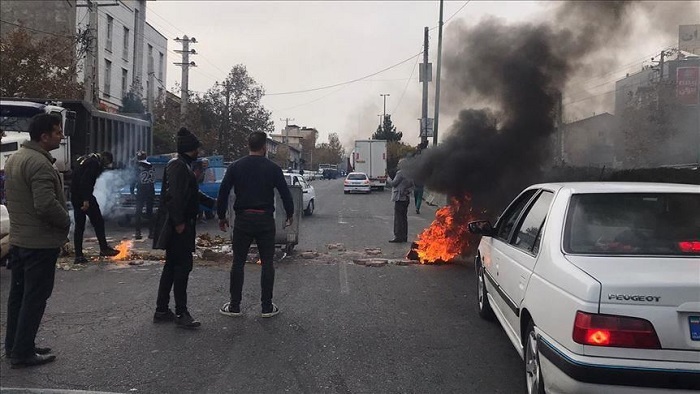
Protests are still happening all over Iran almost three years after the historic uprising in November 2019 that involved people from all walks of life. Iranian society is becoming more widely acknowledged as an explosive by the regime’s own institutions and state media.
It lists various forms of social defiance that are still occurring in Iran, including “disturbance, unrest, chaos, and other collective protesting behaviors.”
The recently released study looked at the national uprisings in January 2018 and November 2019 as well as subsequent demonstrations, some of which are still going on and could pave the way for more uprisings in the future.
The study came to the following conclusion: “With the continuation of the economic crisis and the sharp increase in the feeling of injustice and inequality in society if uprisings are formed again, nearly 75% of people will participate in the protests.”
According to this study, which purports to have been conducted in Tehran, nearly 67.2% of Iranians have endured “relative deprivation” at “high levels.” In addition, it revealed that 59.4% of respondents in Iran “consider the country’s situation anomalous and abnormal,” while 82.2% of respondents “insist they have not yet met their needs.”
The alleged civil disobedience in question entails letter-writing campaigns, strike actions, and protests. The rising practice of rebellious youths attacking the regime’s bases counts as a non-civil protest. These actions continue despite the government’s increased use of lethal injections under Ebrahim Raisi in an effort to terrorize the populace.
Although fabricated, the statistics used in the SNDU study show that a revolution in Iranian society is imminent. There is no need to look into the gloom to understand that Iran’s ruling theocracy makes it illegal to express anti-regime thoughts, even though the number of arbitrary arrests and executions is increasing.
What was the takeaway of the Iran uprising in Nov 2019, in 200 cities, despite 1,500 murdered by the regime as people called for #FreeIran and the world saying #WeStand4FreeIran
— Alireza Jafarzadeh (@A_Jafarzadeh) November 1, 2020
The study also emphasizes that “social blockage” and “feeling of relative deprivation” are both exacerbated by economic inequality. The authors further stated that “civil and social dissatisfaction can also be a manifestation of the feeling of deprivation.”
In order to lessen unhappiness and stop the spread of protests, this study was presented as a warning to regime officials, urging them to begin “reforming political governance” and “social justice.” The report calls on regime leaders to equally distribute wealth among all Iranians and to respect the rights of ethnic and religious minorities.
According to the report, officials should “hand over jobs based on acquired skills, experience, and expertise” and should avoid and combat “nepotism.”
While this study reveals the regime’s frailty and the volatile nature of Iranian society, a different study by the same institution casts doubts on the purported “stability” that regime officials continue to boast about.
The study “Iran after [the Persian Year] 1400” emphasizes how the sanctions, the regime’s poor handling of economic impulses, and its policies over the past three decades “promise a deep social change in the near future” in addition to the two significant protests that took place in January 2018 and November 2019.
 MEK Iran (follow us on Twitter and Facebook), Maryam Rajavi’s on her site, Twitter & Facebook, NCRI (Twitter & Facebook), and People’s Mojahedin Organization of Iran – MEK IRAN – YouTub
MEK Iran (follow us on Twitter and Facebook), Maryam Rajavi’s on her site, Twitter & Facebook, NCRI (Twitter & Facebook), and People’s Mojahedin Organization of Iran – MEK IRAN – YouTub







